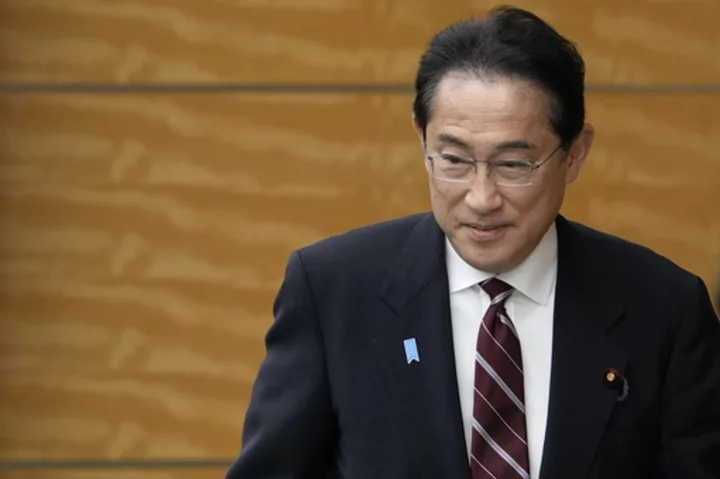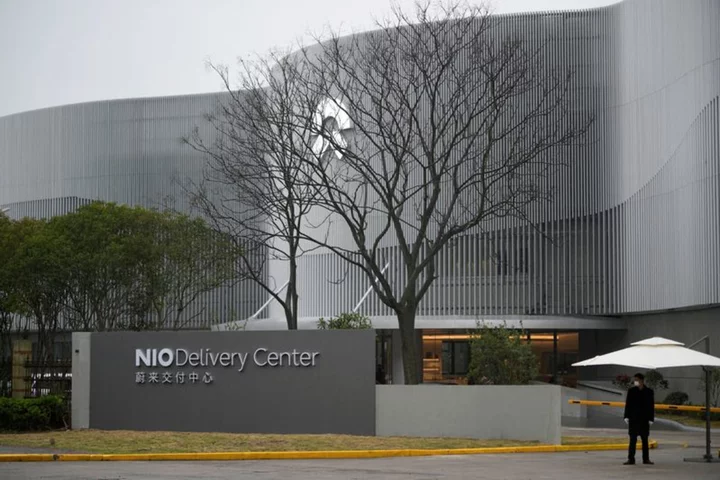TOKYO (AP) — Japan approved a major revision to its development aid policy Friday to focus on maritime and economic security and its national interests while helping developing nations overcome compound challenges amid China's growing global influence.
The revision to the Development Cooperation Charter, approved by Prime Minister Fumio Kishida’s Cabinet, comes two years early since the last was in 2015 and updates are usually on a 10-year cycle. That underscores the sense of urgency in addressing widening China concern and other global challenges such as the impact of Russia's war on Ukraine.
Japan in December adopted a new National Security Strategy, setting a goal of doubling defense spending to 43 trillion yen ($310 billon) over the next five years to fund a military buildup. That means Japan, with fiscal conditions already tight, must use development aid more effectively and strategically.
Under the new security strategy, Japan’s Foreign Ministry has launched official security assistance, or OSA, for the militaries of developing nations primarily in the Indo-Pacific region and is likely to provide Japanese-made, non-lethal equipment like radars, antennas, small patrol boats or improvements of infrastructure such as ports.
Ministry officials say that's different from assistance under the Development Cooperation Charter, which sticks to non-military cooperation and ensuring peace and prosperity, while focusing on human security as “a guiding principle."
The Foreign Ministry in April had 571 billion yen ($4.1 billion) development aid for non-military purposes and, separately, 2 billion yen ($15.2 million) to help strengthen national security of the “like-minded” Indo-Pacific militaries.
Under the revised charter, Japan will prioritize measures to combat climate change, food and energy crisis triggered by Russia’s invasion of Ukraine, as well as strengthening maritime security, supply chain resiliency and digital transformation.
“The international community is at a historic turning point, facing compound crises,” the revised charter stated, noting worsening global challenges such as climate change, infectious diseases, serious challenges to the free and open international order and risks of fragmentation, and their impact on developing nations.
The growing challenges make development aid a more important diplomatic tool than ever, at a time cooperation with so-called Global South countries as equal partners is key to gain their consensus on vital issues such as Russia’s war on Ukraine, China’s growing assertiveness, debt and development issues as well as climate change, Foreign Ministry officials say.
Japan aims to work with recipient nations as equal partners in creating social values to promote shared cycle of growth and rules-based free and open international order — a vision that Japan promotes along with the United States and other democracies as a counter to China.
To do that, Japan may offer development funding for infrastructure projects like fisheries or tourism on remote islands in the South China Sea or the South Pacific, officials say.
Many Southeast Asian nations may be eager to balance their relationships with both Japan and China, while trying to get more from both. The revised charter stresses the importance of working with the private sector and civil society and bringing in new funding as Japan takes care not to put other nations on the spot as they build ties.
Japan also wants to take the initiative to set international rules and guidelines as a donor nation that are based on inclusiveness, transparency and fairness.
China's aid donations in Africa and elsewhere have trapped many recipient countries in debt while allowing the Chinese access to local ports and other infrastructure.
___
Find more AP coverage of the Asia-Pacific region at https://apnews.com/hub/asia-pacific









